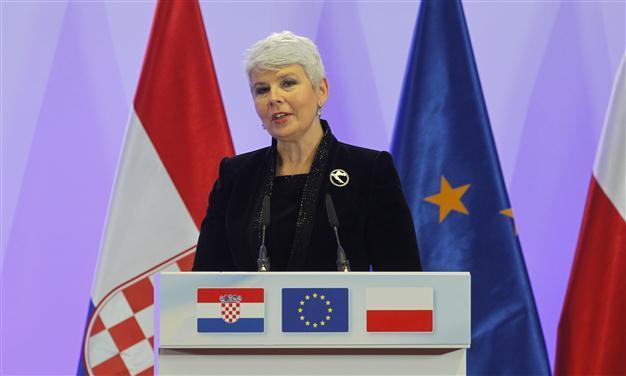Croatia signs EU accession treaty
BRUSSELS - Agence France-Presse

Croatian Prime Minister Jadranka Kosor speaks during the Signature of the Accession Treaty of Croatia on the sidelines of EU summit in Brussels on Friday, Dec. 9, 2011. AP Photo
Croatia signed an EU accession treaty Friday, a move paving the way for the former Yugoslav republic to join the bloc in mid-2013, after almost a decade of long and often fraught negotiations."You are warmly welcomed in the European family," said EU president Herman Van Rompuy.
"We are finally crossing the threshold of our European home," said President Ivo Josipovic, who along with Prime Minister Jadranka Kosor signed the legal paperwork at a ceremony attended by the European Union's 27 heads of state and government.
The signing ceremony was the culmination of a long-held ambition, but comes at a tough moment as Europe's debt crisis undermines the unity of the bloc and saps the enthusiasm of ordinary Croatians.
Croatia's moment of triumph took place just hours after a bruising night of talks for EU leaders, who failed to agree a change to their treaty to tackle the crisis, winding up negotiations just after 5:00 am (0400 GMT) with a new and separate pact for the eurozone that threatens dire divisions.
Hinting the crisis could douse the attraction of EU membership for the former Soviet states of eastern Europe, European Commission chief Jose Manuel Barroso said: "We should not let the economic crisis overshadow this very important policy" of enlargement.
Before Zagreb can formally join the bloc on July 1, 2013, citizens will get to vote on the question in a referendum early next year.
The latest survey suggested that around 60 percent of Croatians would back EU membership.
Croatia on Friday took up observer status at the EU summit, which is to shatter the hopes of Serbia to be granted candidate status, a key step in its road to membership, according to a draft final statement seen by AFP.
Croatia is the second of the six republics that formed the old socialist Yugoslavia, that collapsed in a series of 1990s bloody wars, to join the bloc.
Of the six -- Bosnia, Croatia, Macedonia, Montenegro, Serbia and Slovenia -- only the latter is an EU member, since 2004.
The signing of the treaty marks a historic chapter for Croatia 20 years after it proclaimed independence, sparking a four-year war with Belgrade-backed rebel Serbs.
With a population of 4.2 million, its economy is based mostly on Adriatic coast tourism. It has been largely in recession since early 2009 and the official growth forecast for this year is a modest 0.5 percent.
Unemployment is running at above 17 percent.
















